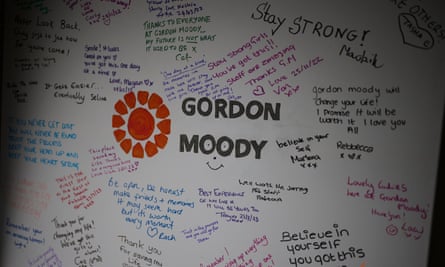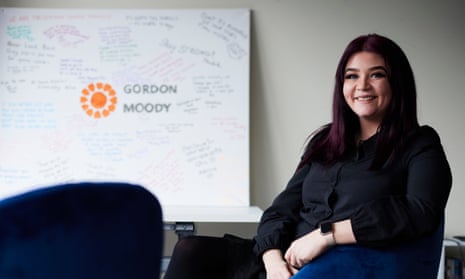At the height of her addiction at the age of 21, Megan Vanderson lost £4,000 in 10 minutes gambling on games and slots online. Hiding her problem was easy. She was glued to her phone 24/7, but most young people are. It was only after years of turmoil that she finally plucked up the courage to seek help – and found she was the only woman in the room.
“Going into Gamblers Anonymous meetings, it was very male-dominated. So I felt that pressure, I didn’t feel like I could speak as openly,” said Vanderson, now 23. “I was on my own at 21 years old and couldn’t understand why I was like this. I had never seen a young woman who had gone through a gambling addiction, ever.”
Then she found out about the gambling addiction treatment centre run by the charity Gordon Moody in Wolverhampton, the only one in the UK and possibly the world that caters specifically for women.
“It changed my life. It was so empowering to realise I wasn’t the only one. Having a safe space for women to speak about their problems and realising that there are other women out there who are going through the same experiences as me,” she said.
Gambling addicts are disproportionately male, but the number of women seeking treatment in the UK doubled in five years, from 1,134 in 2015-16, to 2,423 in 2020-21.
The gambling charity GambleAware has also found that the majority of women affected do not seek help, with two in five unwilling to do so because of stigma and embarrassment.
Research suggests the rise in gambling among women has been fuelled by easy access to betting games online, bypassing traditionally male-dominated spaces such as bookmakers and casinos.
“I would never walk into a betting shop. I was too scared. Why would a 21-year-old girl be in a betting shop?” said Vanderson. “For me it was all online. I could be walking down the street just on my phone and no one would suspect that I was gambling.
“I was gambling on children’s games, in-app purchases, loot boxes, on Xboxes, PlayStations. But it was so secret and hidden. Even speaking about it cringes me out because it’s just so painful.”
For Rebecca, 27, it was fruit machines in pubs where she would go every night that created her addiction. “I couldn’t understand why I couldn’t just stop and walk away,” she said. “When I found out about Gordon Moody, it was that switch I’d been waiting for for over five years. Something just clicked in my head. It was the first place where I felt listened to and not judged.”

Many of the women who use Gordon Moody’s services say a lack of awareness meant their addiction was often dismissed or written off as wider mental health issues.
“Women have reported a lot, sadly, that when they have actually reached out for help and support, it’s misunderstood,” said Sarah Forshaw, the head of service development at Gordon Moody. “We’ve had a lot of women pluck up the courage to go to a doctor and talk about addiction and then be prescribed antidepressants, for example.
“Their addiction is almost swept under the carpet. Gambling addiction is still massively misunderstood and hidden, and women seem to be even more hidden within that.”
On the charity’s free six-week residential course in Wolverhampton, women with gambling addiction undertake therapy – group and individual – and sessions on life skills such as budgeting and shopping, while access to phones and the internet is stripped away.
When they arrive at the custom-made facility, which has been running since 2021, they receive an anonymous note from a course alumnus with words of support.
It’s different to the programme for men, which is longer – the charity found women more often had childcare responsibilities that meant they weren’t able to leave home for long periods of time.
Rachel*, who is in her 40s and has two young children, said her gambling addiction worsened during maternity leave when she was alone at home with her baby. The staff at Gordon Moody said this was a story they had heard from many of the women who use their services.
“After I had a baby I started gambling a lot more because I was at home,” Rachel said. “It gradually got worse until I think I won £30,000 and within three days it was gone. I tried Gamblers Anonymous but I didn’t really feel comfortable because there were so many men.
“Leaving my children to come here was a very difficult decision to make, but it was the last resort. My debt had become completely unmanageable.”
Dr Rosalind Baker-Frampton, the evaluation and research lead at the charity, said a “huge lack of research” about female gambling meant the treatment programme was built from scratch by talking to women about what they needed.
“A lot of treatment is based around research with men, but women have got different life experiences,” she said. “We do find women can mask their addiction for a lot longer than men do. Normally women have been gambling for an average of around seven years before they come to us. Our data shows 66% have children and 87% have some kind of mental health difficulty as well.”
The charity is looking to work with universities and research bodies to share the resources it has gathered from the more than 500 women who have applied to use its services.
Vanderson, who has now recovered from her addiction and is paying back her debts after completing the Gordon Moody programme, said: “I really think this is going to become a public health crisis in a couple of years, it’s going to be rife. And there’s going to be more women than ever probably suffering, the way social media is going.
“On social media, I can’t get away from gambling advertisements. When I was in school we’d have road safety people come in, or we’d have drug awareness courses. Where’s all the gambling stuff? Something needs to change.”
*Names have been changed to protect anonymity.
